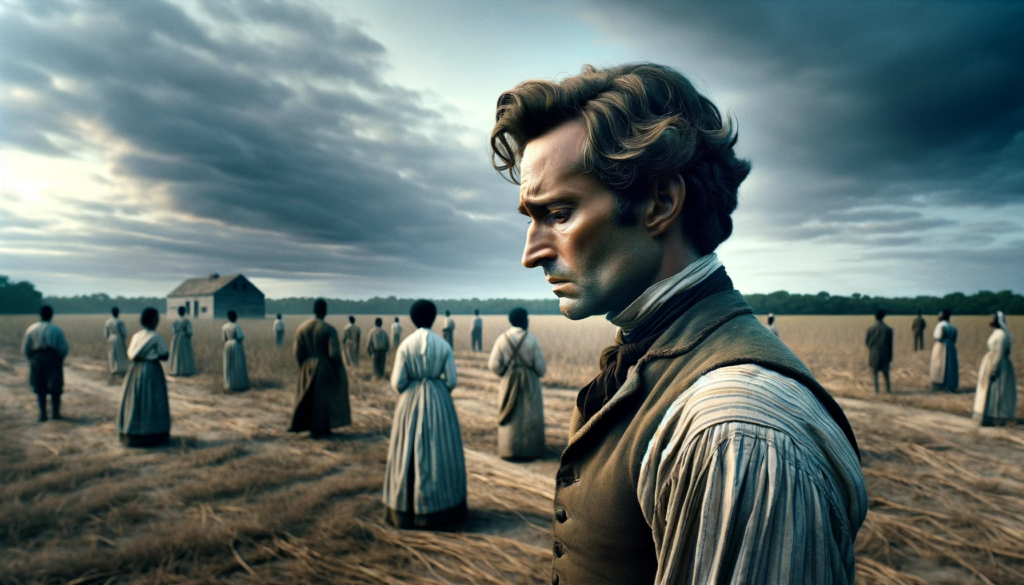Fiery Prodigy & Patriot’s Unyielding Zeal
In the sweltering summer of 1776, a young man stood in a room filled with some of the most radical thinkers of his generation. At just 26, Edward Rutledge was not only the youngest delegate in the Continental Congress but also a fervent advocate for American independence. His signature on the Declaration of Independence was more than just ink on parchment; it was a bold statement of defiance against the mightiest empire of the time and a commitment to an ideal of freedom that was still in its infancy.

Rutledge’s journey to that momentous day was as complex and nuanced as the young nation he helped to forge. Born into a world of privilege and power in Charleston, South Carolina, Rutledge could have easily settled for a life of leisure and influence within the colonial aristocracy. Instead, he chose a path of resistance and leadership in the fight for American liberty, driven by a deep conviction in the rights of the colonies to govern themselves.
Yet, Edward Rutledge was more than just a revolutionary and a signer of the Declaration. His story is a vivid tapestry woven with threads of ambition, loyalty, conflict, and compromise. From his early years in law and politics to his crucial roles during and after the Revolutionary War, Rutledge’s life embodies the complexities and contradictions of America’s founding generation. He was a staunch defender of his state’s interests, a skilled orator who could sway opinions in the Congress, and a man whose views evolved in the face of the nation’s foundational challenges.
As we delve into the life and legacy of Edward Rutledge, we uncover not just the story of a founding father, but a narrative that reflects the birth pains of a nation striving to define its identity. Rutledge’s journey from a young lawyer in colonial America to a key figure in the struggle for independence offers a unique lens through which to view the American Revolution—a lens that reveals the courage, the contention, and the compromises that marked the inception of the United States.
Join us as we explore the multifaceted life of Edward Rutledge, whose youthful vigor and passionate advocacy left an indelible mark on the fabric of American history. Through his story, we gain insight into the enduring quest for liberty and justice that continues to shape our nation today.
Early Life and Education: Foundations of a Revolutionary
In the lush, colonial landscapes of Charleston, South Carolina, on November 23, 1749, Edward Rutledge was born into a world of contrast and change. The Rutledge family was well-established and respected, with strong ties to the legal and political circles of the colony. His father, Dr. John Rutledge, was an immigrant from Ireland who had carved out a significant place for himself in the New World. This environment of privilege and potential set the stage for Edward’s early life, but it was his education and personal experiences that molded his revolutionary zeal.
Edward was the youngest of seven children, and from an early age, he was immersed in the world of learning and enlightenment ideals. The Rutledge household valued education and the cultivation of intellect, ensuring that Edward received the best schooling available at the time. His early education in Charleston laid the foundation for his intellectual pursuits, but it was his journey to England for further studies that would profoundly shape his worldview.
In 1769, Edward sailed across the Atlantic to study law at the Middle Temple in London, one of the Inns of Court that has educated some of history’s most prominent legal minds. This period in England was pivotal for Rutledge. Immersed in the vibrant intellectual and political debates of the time, he was exposed to the fermenting ideas of liberty, governance, and the rights of individuals. The contradiction between these ideals and the realities of British colonial policies was not lost on Rutledge. His time in England, coupled with his studies in law, honed his oratorical skills and deepened his understanding of the principles that would later underpin the American Revolution.
Returning to Charleston in the early 1770s, Rutledge quickly made a name for himself as a brilliant lawyer and a charismatic public speaker. His experiences in England had left him with a profound belief in the American colonies’ right to self-governance and a deep-seated resentment of British overreach. This conviction led him to join the burgeoning movement for American independence, aligning himself with other radical voices calling for a break from British rule.
As tensions between the colonies and the British Crown escalated, Rutledge’s legal expertise and eloquent oratory became invaluable assets to the patriot cause. He was soon thrust into the heart of the revolutionary fervor sweeping through the colonies, his destiny intertwined with the tumultuous events that would lead to the birth of a nation.
Political Career and Contributions: A Voice for Independence and Compromise
Edward Rutledge’s return to Charleston marked the beginning of an illustrious political career deeply intertwined with the American quest for independence. His transition from a promising lawyer to a committed revolutionary and statesman was swift, fueled by the escalating conflicts between the American colonies and the British Crown.

Continental Congress: A Delegate’s Dilemma
In 1774, Edward Rutledge’s journey took a decisive turn when he was selected as one of South Carolina’s delegates to the First Continental Congress. This assembly of colonial representatives was a direct response to the British Parliament’s Coercive Acts, perceived as punitive measures against the colonies following the Boston Tea Party. Rutledge, despite his youth, quickly emerged as a significant figure in the Congress, known for his persuasive eloquence and unwavering commitment to colonial rights.
However, Rutledge’s political stance was nuanced. He advocated for reconciliation with Great Britain, believing that a compromise could be reached to address the colonies’ grievances without severing ties. This position was emblematic of the broader debates within the Congress, where delegates grappled with the path forward—reconciliation or independence.
The Declaration of Independence: A Youthful Signature
The shift from seeking compromise to declaring independence was a monumental transition in American history, and Edward Rutledge played a crucial role in this process. By the time the Second Continental Congress convened in 1776, the mood had shifted significantly. The publication of Thomas Paine’s “Common Sense” and escalating hostilities had galvanized support for independence.
Rutledge’s own views evolved during this period. Although he had initially resisted the push for immediate independence, arguing for more substantial foreign support and unity among the colonies, he ultimately signed the Declaration of Independence on July 4, 1776. His signature represented not just South Carolina’s commitment to the cause but also marked Rutledge as the youngest signatory—a testament to the young nation’s belief in the principles of liberty and self-determination.
Military Service and Leadership
Edward Rutledge’s contributions to the American Revolution extended beyond the halls of Congress. He served in the South Carolina militia, demonstrating his commitment to the cause with actions as well as words. His military service, particularly his involvement in the defense of Charleston, underscored the sacrifices made by many of the Revolution’s leaders.

Following the war, Rutledge’s political career continued to flourish. He played a significant role in shaping the post-revolutionary legal and political landscape of South Carolina and the new nation. His leadership helped guide the state through the challenges of rebuilding and governance, always with an eye towards the delicate balance of power and the ideals for which the Revolution had been fought.
Personal Anecdotes: The Man Behind the Signature
Edward Rutledge, like many of his contemporaries, was a man of his times—complex, multifaceted, and sometimes contradictory. Beyond his political and military contributions, Rutledge’s personal life, beliefs, and interactions offer intriguing insights into his character and the era he lived in.
A Family Man with Deep Ties
Edward Rutledge married Henrietta Middleton, uniting two of South Carolina’s most influential families. This alliance was not just a personal bond but also a reflection of the interconnectedness of colonial American society, where family ties often influenced political and economic landscapes. Together, Edward and Henrietta had three children, embedding Rutledge deeply in the social fabric of his time.
The Duelist: Honor Above All
Rutledge lived in an era where personal honor was defended with fervor, sometimes leading to duels. While there is no record of Rutledge participating in a duel himself, his brother John was challenged to one by a political adversary. Edward’s involvement in negotiating the terms of this duel, striving to uphold his family’s honor while avoiding unnecessary violence, showcases the delicate balance of principles and pragmatism that defined his life.
Slavery: A Troubling Legacy
One of the most challenging aspects of Rutledge’s legacy is his stance on slavery. As a plantation owner, he owned slaves, and his wealth was built on the labor of enslaved African Americans. During the Continental Congress debates, Rutledge was a staunch defender of slavery, arguing against its condemnation in the Declaration of Independence. This position was not uncommon among Southern delegates, reflecting the deep-seated economic and social systems of the time. Yet, it presents a stark contradiction to the ideals of liberty and freedom that Rutledge fought for, highlighting the complex moral landscape of America’s founding era.
The Zenger Trial: A Glimpse into Legal Acumen
Though not directly involved, Rutledge’s interest in the John Peter Zenger trial, a landmark case for freedom of the press in colonial America, speaks to his beliefs in liberty and justice. This trial, which occurred decades before Rutledge’s prominence, was nonetheless emblematic of the evolving American values that he would come to defend. Rutledge’s legal career was marked by a commitment to justice, often advocating for the rights of individuals against the prevailing norms of his time.
Legacy: The Enduring Impact of Edward Rutledge
Edward Rutledge’s journey from a young, ambitious lawyer to a founding father of the United States encapsulates the tumultuous and transformative nature of the American Revolution. His signature on the Declaration of Independence symbolizes not just his personal commitment to the cause of liberty but also marks him as a key player in the collective endeavor to establish a new nation.
A Legacy of Leadership and Contradiction
Rutledge’s contributions extend beyond his role in the Continental Congress and the battlefields of the Revolutionary War. As a state legislator, a governor of South Carolina, and a distinguished lawyer, he helped shape the political and legal frameworks of his state and the emerging nation. His leadership during and after the war played a significant role in navigating the challenges of independence, governance, and national identity.

Yet, Rutledge’s legacy is not without its complexities. His ownership of slaves and defense of slavery at the Continental Congress highlight the profound contradictions within the founding generation. These men fought for liberty and justice while simultaneously upholding a system that denied these very rights to countless individuals. Rutledge’s stance on slavery forces us to confront the uncomfortable realities of America’s founding and the flawed humanity of its leaders.
Reconciling the Past with the Present
Reflecting on Edward Rutledge’s life and contributions offers us an opportunity to engage with the complexities of historical memory. How do we honor the achievements of the founding fathers while acknowledging their participation in and perpetuation of slavery? Rutledge’s story, like that of many of his contemporaries, challenges us to consider the multifaceted nature of historical figures—recognizing their contributions to our nation’s founding while critically examining the moral and ethical shortcomings of their actions.
Edward Rutledge’s Place in American Memory
Today, Edward Rutledge’s legacy serves as a reminder of the enduring struggle to live up to the ideals of liberty and justice for all. As we navigate the challenges of our own time, his life prompts us to reflect on the ongoing journey toward a more perfect union. It encourages us to strive for a deeper understanding of the past, to acknowledge its complexities, and to work towards reconciling the ideals of the founding with the realities of our shared history.
Conclusion: Edward Rutledge’s Place in American Memory
Edward Rutledge’s story is a testament to the courage, conviction, and complexity of the American founding generation. His contributions to the birth of the United States are indelibly etched into the fabric of the nation’s history. Yet, his legacy also compels us to confront the contradictions of the past and to engage in a nuanced and critical dialogue about the ideals upon which America was founded. By examining Rutledge’s life in its entirety, we gain insight into the challenges of founding a nation on principles of liberty and equality while grappling with the realities of their implementation.
In remembering Edward Rutledge, we honor both his contributions to American independence and the ongoing effort to reconcile the nation’s founding ideals with the imperative of justice and equality for all its citizens. His life story enriches our understanding of the American Revolution and its complex legacy, inspiring us to continue striving towards a future that fully embodies the ideals for which he stood.
Posts
- Exploring the Rich Tapestry of American History, Culture, and Trivia (15 December 2023)
- Welcome to American Facts 101: Your Ultimate Source for Exploring American History, Culture, and Trivia (15 December 2023)
- Uncovering the Hidden Gems of the USA (15 December 2023)
- Uncovering the Untold Stories of the USA (15 December 2023)
- Exploring the Rich Tapestry of American History and Culture (15 December 2023)
- Revealing America’s Saga: The Untold Chronicles of a Nation (15 December 2023)
- Charles Carroll: The Wealthiest Revolutionary and Fearless Freedom Advocate (15 December 2023)
- Revealing The Bill of Rights: Fortifying Our Precious Liberties! (22 December 2023)
- Benjamin Franklin Exposed: Maverick Creator, Shrewd Diplomat, Timeless Visionary (22 December 2023)
- Revealing Alexander Hamilton: The Visionary Maverick Who Sculpted America’s Future (28 December 2023)
- Jefferson’s America: How a Founding Father Forged a Nation’s Destiny (30 December 2023)
- Father of the Nation: How John Adams Shaped America’s Destiny (1 January 2024)
- Forgotten Trailblazers: Revealing the Covert Champions of the Revolution (3 January 2024)
- America’s Gilded Epoch: A Tale of Swift and Monumental Change (5 January 2024)
- Unveiling the Declaration: A Beacon of Liberty and Hope (6 January 2024)
- The Great Depression: Resilience in the Face of Adversity (11 January 2024)
- Revolutionizing Brilliance: The Daring Leap of America’s Industrial Breakthrough (14 January 2024)
- Navigating the Rugged Terrain of Civil Rights Victory (18 January 2024)
- A Decade of Revolutionary Transformation and Lavish Exuberance (19 January 2024)
- Space Odyssey: America’s Bold Soar into the Celestial Frontier (21 January 2024)
- The Oregon Trail: Pioneers and Perils of the Westward Expansion (26 January 2024)
- The Louisiana Purchase: A Colossal Expansion of America’s Realm (27 January 2024)
- The Profound Influence of Immigration on the USA (28 January 2024)
- The Gold Rush: Dreams and Hardships in the West (9 February 2024)
- The Forbidden Decade: America’s Fervent Quest for Virtue (28 February 2024)
- Swinging Rhythms, Daring Flappers: A New Vision of the American Dream (1 March 2024)
- The Salem Witch Trials: Dread and Justice in Early American Colonies (3 March 2024)
- The Echoes of Liberty – Unveiling Federalist No. 1 (23 March 2024)
- Edward Rutledge: A Vanguard Spirit of Liberty’s Dawn (23 March 2024)
- John Jay: Pioneering Crusader for American Justice (29 March 2024)
- Revolt & Reason: The Untold Power of ‘Cato 1 (1 April 2024)
- Hidden Virtues: George Washington’s Secret Acts of Kindness (9 April 2024)
- How Jefferson’s Love for Meteorology Shaped the White House (9 April 2024)
- Echoes of the Night: Secrets of Navajo Skinwalkers Unveiled (10 April 2024)
- Ghost Ships of the Great Lakes (10 April 2024)
- Lincoln’s Grit: Unveiling the Wrestler-President (11 April 2024)
- Unity or Peril? The Covert Threat of Foreign Interference (14 April 2024)
- Roosevelt’s Midnight Quest: Secrets at the Smithsonian (14 April 2024)
- Revolutionary Ripples: Adams’ Potomac Epiphanies (14 April 2024)
- Washington’s Ale of Liberty: A Pioneering Patriotic Brew (14 April 2024)
- Visionary Rebellion: The Architect of U.S. Freedom (20 April 2024)
- Revealing the Legacy: The Enigma of Anti-Federalist Ideals (21 June 2024)
Categories
Tags
- Bill of Rights
- American history
- governance
- John Adams
- Founding Fathers
- American Revolution
- unsung heroes
- independence
- Great Depression
- resilience
- Gilded Age
- social changes
- Declaration of Independence
- American culture
- national identity
- economic hardship
- American Industrial Revolution
- technological advancements
- key inventions
- industrial growth
- Civil Rights Movement
- racial discrimination
- equality
- 1920s
- Roaring Twenties
- economic boom
- Space Race
- United States
- Soviet Union
- Oregon Trail
- westward expansion
- Louisiana Purchase
- immigration
- diverse cultures
- Gold Rush
- American West
- mining towns
